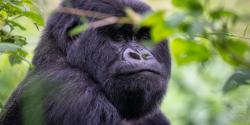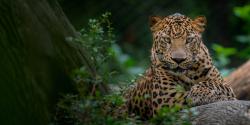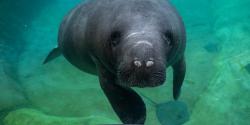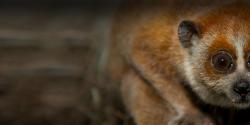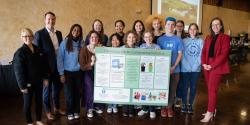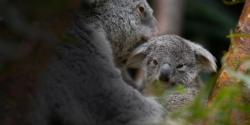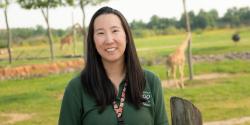Powell, OH— On Saturday, May 11, the Columbus Zoo and Aquarium will honor Dr. Karen Eckert, the executive director of the Wider Caribbean Sea Turtle Conservation Network (WIDECAST), with its biennial Commitment to Conservation Award. The honor includes a $50,000 grant, made possible with the generous support of award sponsors, Kim and Steve Germain and the Germain Motor Company. Dr. Eckert will be recognized at the Zoo’s 10th annual Wine for Wildlife event, presented by OhioHealth, which raises funds to support the Zoo’s international wildlife conservation grant program.
Dedicated to averting the extinction of six species of endangered sea turtles in the Caribbean basin, WIDECAST embraces the largest network of sea turtle research and conservation projects in the world. Volunteer Country Coordinators serve in more than 40 Caribbean nations and territories, and the network emphasizes science-based tools in national policy-making and community conservation initiatives. Eckert’s leadership of this unique international network constitutes an achievement unparalleled in marine biodiversity conservation as sea turtles face threats, including: the illegal harvest for their shells, meat and skin; getting caught in fishing nets as by-catch; eating or getting tangles in marine debris like plastics; and the loss of nesting beaches due to development rising sea levels.
Saving sea turtles requires the coordination of local communities, governments, scientists, and others, and Eckert’s sea turtle conservation contributions include a landmark series of “Sea Turtle Recovery Action Plans,” the first species-level recovery plans ever developed for many Caribbean nations, providing Caribbean governments and non-governmental organizations (NGOs) with priority recommendations for the recovery of declining sea turtle populations. In addition to convincing governments and rural communities alike to become more involved in conservation, Eckert has guided this vast region in the design and implementation of international programs, including a centralized tag database, index population monitoring, sea turtle-based school curricula, harmonized legislation, alternative livelihood strategies, research on migratory pathways, and more. Eckert has also led the network in peer-training and the development of standardized best practices as a way for the tide to “raise all boats.” Her diverse portfolio of publications includes training modules and handbooks for responding to sea turtles in distress, surveying critical habitat, monitoring reproductive activity, guiding fishers to use less destructive gear, instructing beachfront hotels in protecting adjoining nesting habitats, and much more.
Eckert’s work is one of more than 80 projects in over 40 countries that are supported by funds raised through the Columbus Zoo. Since 1994, the Zoo has contributed over $170,000 to Eckert’s work. She was selected to receive the Commitment to Conservation Award by exemplifying how collaborations between field researchers and zoos can help save wildlife.
“Dr. Eckert is a brilliant scientist, as well as a warm, charismatic, and natural leader who has an incredible capacity for getting people excited about a common goal, and her passion for sea turtle conservation is unrivaled, both in results and its scope,” said Doug Warmolts, Vice President of Animal Care at the Columbus Zoo and Aquarium. “Not only does Dr. Eckert apply the Columbus Zoo’s support to her field work but the information she gains and shares with us is used to help inspire and educate millions of our guests with ways they, too, can be directly involved in sea turtle conservation.”
When Eckert accepted the position of executive director of the fledgling WIDECAST in late 1989, few thought such a network possible. Today, this innovative program is a model for multilateral marine resource management in the Caribbean Sea and throughout the world. Grassroots organizations have been formed in more than 20 nations; remarkably, 70% of Caribbean governments now protect sea turtles, and Eckert has inspired thousands of people, mostly in poor countries, to actively create a more sustainable future. As a direct result of her efforts, the Caribbean Sea is today the only regional sea in the world where selected populations of all native sea turtle species are seen to be rising.
“Dr. Eckert recognizes that with the number of threats that wildlife species face, effective conservation has to address a number of complexities,” said Tom Stalf, President and CEO of the Columbus Zoo and Aquarium. “The Columbus Zoo and Aquarium is proud to be a long-term supporter of Dr. Eckert’s work as her commitment, resolve, and vision continues to inspire individuals, communities, and governments to come together to make a positive impact for sea turtles and their future.”
In 1994, her early achievements also earned her an induction into the “Global 500 Roll of Honor for Environmental Achievement” by the United Nations, when UNEP characterized her as “one of the most important figures in conservation and grassroots community empowerment in the field of endangered species in the Wider Caribbean Region.” In 1996, she was among the first cohort of Pew Fellows in Marine Conservation, a prestigious three-year fellowship that specifically recognized her efforts to restore depleted sea turtle populations and promote sustainable coexistence between Caribbean people and their marine resources. Additionally, she received the 2003 Chevron Texaco Conservation Award for “providing the world with a unique model that shows how people and marine life are not only able to coexist, but to flourish.”
Eckert will be the fourth recipient of the Zoo’s Commitment to Conservation Award. The Columbus Zoo established this award in 2011 to publicly recognize and reward the unsung heroes of global wildlife conservation and to honor the lifetime achievements and dedication of our field conservation partners. The previous recipients are: Claudine Andre, Lola Ya Bonobo founder, who established a sanctuary for bonobos in Kinshasa Province, Democratic Republic of Congo; Marc Ancrenaz, co-founder of the Kinabatangan Orangutan Conservation Program (KOCP) based in Borneo, who works to raise awareness about the orangutan and the importance of protecting the species’ habitat; and Dr. Patrícia Medici, the founder of the Lowland Tapir Conservation Initiative (LTCI; IPÊ – Instituto de Pesquisas Ecológicas, Institute for Ecological Research) in Brazil, who helped discover the vital role tapirs play in the ecosystems they inhabit.
###
About the Columbus Zoo and Aquarium
Home to more than 10,000 animals representing over 600 species from around the globe, the Columbus Zoo and Aquarium leads and inspires by connecting people and wildlife. The Zoo complex is a recreational and education destination that includes the 22-acre Zoombezi Bay water park and 18-hole Safari Golf Course. The Columbus Zoo and Aquarium also manages The Wilds, a 10,000-acre conservation center and safari park located in southeastern Ohio. The Zoo is a regional attraction with global impact; annually contributing $4 million of privately raised funds to support conservation projects worldwide. A 501(c)(3) nonprofit organization, the Columbus Zoo has earned Charity Navigator’s prestigious 4-star rating.

